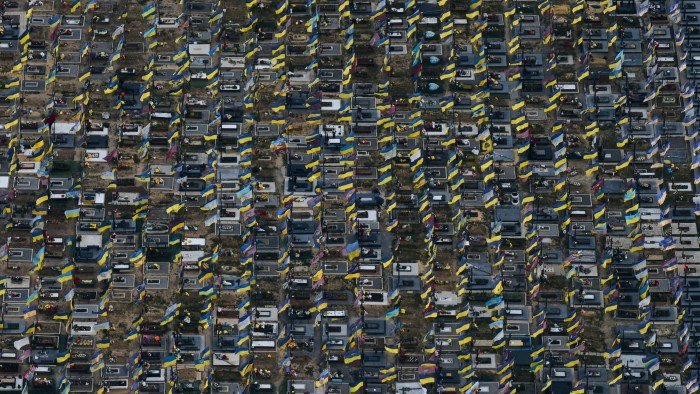In 1909 the journalist Norman Angell wrote The Great Illusion. As the clouds of war gathered over Europe, he offered reassurance. The prosperity and interdependence ushered by an age of globalisation would persuade leaders of the folly of fighting each other. If there was a war it would be brief. Then came the Great War, a conflict that endured for four years and wiped out a generation of the continent’s young men.
Fast forward seven decades to the end of the cold war, and substitute for Angell the American political scientist Francis Fukuyama. The defeat of communism, his thesis ran, marked the triumph not just of western democracy, but also the economic liberalism that had ushered in another era of globalisation. Fukuyama was far from alone in suggesting this shared prosperity marked the end of wars between states.
Vladimir Putin was not listening. And in the Russian leader’s war against Ukraine the west has learnt the hard way that the seemingly ineluctable truths of economics are easily pushed aside by deeper human passions.
Among the many interesting observations in Blood and Treasure, Duncan Weldon’s economic history of wars since the first millennium, is that until the late 19th century the impact of conflict on the prosperity of the combatants was ambiguous. And the need to finance them often provided a spur to the political transformation from autocracy to democracy. But the “total wars” of 1914-18 and 1939-45, with their emphasis on the complete destruction of national infrastructure, removed any doubt about the economic as well as terrible human cost of human conflict.
None of this is to say that economics did not play a pivotal role in shaping the wars that regularly scarred the European continent. And there were lots of them. Britain and France, Weldon writes, were fighting each other for 68 of the 126 years between Britain’s Glorious Revolution in 1688-89 and the defeat of Napoleon in 1815.
For Weldon there are two organising threads through these myriad conflicts. The first comprises the economic incentives at once driving and determining the outcomes; and the second, the institutional frameworks — states, political systems and societal norms — shaped by conflict. Economics and institutions do not explain everything, he admits (and sometimes, as in the American attempt to defeat North Vietnam, those fighting can badly misread the incentives) but, by and large, Weldon argues, “following the money” is the best way to understand the conflicts.
His book is a good read, charting tumultuous upheavals from the raids of Eric Bloodaxe and his Viking kin that overturned the post-Roman order in Britain and weaving through about a dozen other military campaigns from Genghis Khan’s epic conquest of Eurasia to Spain’s empire-building in the Americas and the economics of rebellion against the British in India before concluding with the war in Ukraine.
The broad sweep of the narrative is leavened with intriguing, and counter-intuitive, detail — spanning the grasp of political economy that turned 17th-century piracy into a serious business model to the productivity miracle that saw Britain defeat its much larger neighbour France in the race for imperial primacy. Along the way the reader is introduced to the relative merits of longbows and crossbows, the role of corruption in the rise of the British navy, and the self-defeating dimension of the Luftwaffe’s rewards for bravery.

The narrative is generally illuminating but the argument is sometimes more than stretched. The hysteria that led many thousands of women (and some men) to a gruesome death in the “witch trials” that swept across Europe during the 16th and 17th centuries cannot be explained by a battle “to dominate Europe’s religious market” between the established Catholic Church and the Protestant Reformation.
As an economist, Weldon places an understandable emphasis on the impact of competition for resources and market mechanisms. What’s missing is human agency — the role of passions, prejudices and superstitions and the destructive power of identity in setting peoples and nations against each other. Doubtless Putin’s declared ambition to reclaim the boundaries of the Soviet empire includes restoring Russia’s former economic strength, but the Russian leader’s messianic mission has deeper roots than those found in textbooks.
Yes, incentives and institutions play a pivotal role. But history is also written by people. What would the 20th century have looked like, I sometimes wonder, in the absence of Hitler and Stalin? Or, for that matter, Churchill?
Blood and Treasure: The Economics of Conflict from the Vikings to Ukraine by Duncan Weldon Abacus Books £25, 320 pages
Philip Stephens is an FT contributing editor
Join our online book group on Facebook at FT Books Café and follow FT Weekend on Instagram, Bluesky and X





